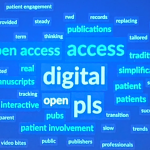This week, we signpost the Next 50% project from OASPA, which aims to support the transition from 50% to 100% open access, and we remind readers to submit their research abstracts to ISPOR Europe 2025. We also highlight an upcoming webinar about the United2Act initiative and an opportunity to contribute to the future of the UKRI research data policy. Finally, we read CONSORT 2025, explore the time and cost savings associated with systemic adoption of PIDs, and revise six evidence-backed arguments to use when seeking support for publication extenders.
To engage with:
Embrace the Next 50% of open access via OASPA
While about half of the transition to open access has been accomplished, the other (arguably tougher) half remains to be achieved. Taking the first step towards achieving the Next 50%, the Open Access Scholarly Publishing Association (OASPA) and Research Consulting will engage with publishing and communication organizations and funders to “enable constructive and meaningful progress across stakeholder groups, and inform transition journeys to publishing and supporting open access.” Stakeholders across the scholarly communications landscape are invited to express their interest in participating in this project before Monday 28 April.
Submit your research abstracts to ISPOR Europe 2025 via ISPOR
It’s time to submit your research abstracts to the 2025 Europe meeting of the International Society for Pharmacoeconomics and Outcomes Research (ISPOR). Taking place in Glasgow, Scotland from Sunday 9 to Wednesday 12 November 2025, ISPOR promises a must-attend event for all those interested in exploring the latest trends in health economics and outcomes research. Research abstract submission is open until Friday 27 June; detailed submission instructions can be found on the ISPOR website.
United2Act against papermills via COPE
United2Act is a joint project by the Committee on Publication Ethics (COPE) and the International Association of Scientific, Technical and Medical Publishers (STM) that “unites, educates, and mobilises a diverse coalition of stakeholders committed to collective action against the critical issue of paper mills”. Join Working Group 1 on Wednesday 14 May or Thursday 15 May for this webinar titled How to recognise, avoid and prevent paper mills.
Shape the future of the UKRI research data policy via UKRI
UK Research and Innovation (UKRI) is developing a new research data policy that will streamline the sharing and management of research data and digital objects arising from UKRI-funded research. Stakeholder feedback on the draft research data policy is welcomed until Wednesday 9 July. More information about the updated policy and how it has been developed will be available at a webinar on Wednesday 7 May.
To read:
CONSORT 2025: updated guidelines for reporting randomized trials via JAMA Network | 15-minute read
The 2025 update of the CONsolidated Standards Of Reporting Trials (CONSORT) statement is now available. The latest statement has been updated to account for methodological advancements and to incorporate feedback from end users. Authors, reviewers, editors and others are encouraged to consult CONSORT 2025 when writing and evaluating manuscripts that report on randomized control trials. The full statement and details about the development process can be found in this article, published in JAMA.
PIDs facilitate time and cost savings via The Scholarly Kitchen | 5-minute read
“The time savings from increased adoption of … PIDs could be as high as 7,207 person days per year, representing net savings of around $573k annually,” concludes Alice Meadows (Co-founder of MoreBrains) in this article exploring a recent cost–benefit analysis of persistent identifier (PID) adoption in Czechia. The analysis focused on five priority PIDs – digital object identifiers (DOIs) for research results and for grants, Open Researcher and Contributor iDs (ORCID), Research Activity Identifiers (RAiDs) and Research Organization Registry (ROR) identifiers – to quantify current PID usage and to assess potential benefits of expanded PID use. Read more about the findings in the full report.
Six evidence-backed arguments in support of publication extenders via The MAP | 9-minute read
Tired of scrambling to justify the development of publication extenders to your team? Look no further than this article from the International Society for Medical Publication Professionals (ISMPP) Digital/Visual Communications Committee. Here, Kelly Soldavin (Senior Editor at Taylor & Francis), Caroline Halford (Business Development Director at Springer Healthcare IME), Adeline Rosenberg (Senior Medical Writer at Oxford PharmaGenesis), Joanne Walker (Co-founder and Publishing Director at Becaris Publishing) and Hamish McDougall (Publishing Solutions Manager at Sage) present six evidence-backed arguments that you can use to support your plans to produce publication extenders. In short, publication extenders increase the impact and reach of scientific articles, making research accessible to broad audiences.
Enjoy our content? Read last week’s digest and check out our latest quarterly update!
Don’t forget to follow us on Bluesky and LinkedIn for regular updates!






